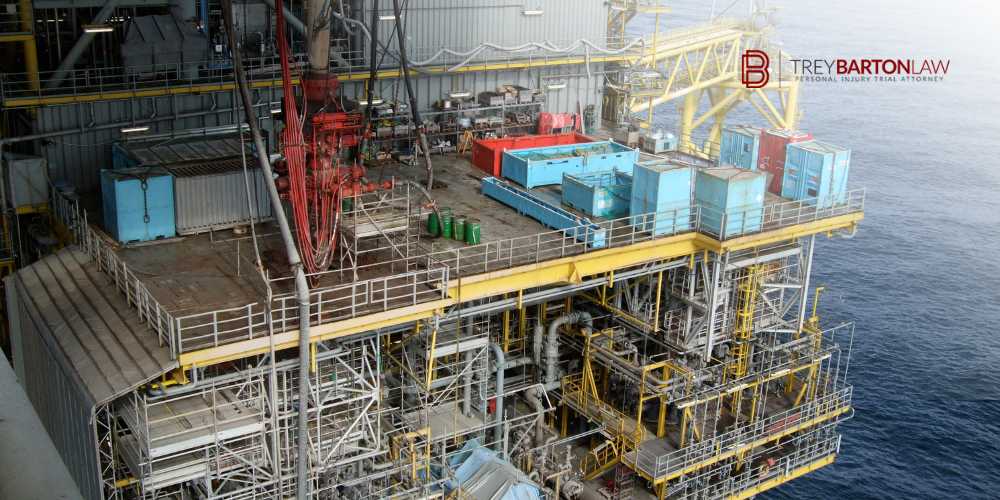Oil and Gas Heavy Equipment Accident Lawyer Texas
The Texas oil and gas heavy equipment accident lawyer team at Trey Barton Law has extensive experience representing oilfield workers and families devastated by catastrophic equipment failures in offshore drilling rig and oilfield industries. Oilfield accidents often involve complex and heavy machinery operating under extreme working conditions. When oil and gas companies neglect equipment maintenance, ignore safety protocols, or don’t take a proactive approach to prevent catastrophic failures, it leads to life-changing injuries and fatalities for employees. Our Texas equipment failure lawyer group understands the high costs oilfield accidents impose, from mounting medical bills to lost wages. These claims often involve high costs, complex welding or machinery breakdowns, and dangerous conditions that can significantly impact a worker’s health and income. We handle oilfield accident cases on a contingency fee basis, so clients pay nothing unless we obtain a fair settlement or award on their behalf.
It’s essential to understand that the employer’s insurers are paid to minimize liability, so refrain from making any recorded statements during investigations.
If you or a family member has been exposed to dangerous worksite conditions, harmed by welding or other high-risk operations, or injured due to the complexity of oilfield equipment, call 713-489-0993 for a free consultation.

Why Choose A Texas Oilfield Equipment Accidents Lawyer From Trey Barton Law
Equipment malfunctions in local oil fields can occur during drilling, completion, production, or maintenance operations, often due to complex working conditions, incorrect tool selection, inadequate maintenance, poor communication, inadequate training, or the overuse of legacy equipment.
In the oil and gas sector, machinery failures can involve drilling motors, BOPs, pumps, cranes, hydraulic systems, and machinery used in transportation or material handling. These breakdowns can cause catastrophic oilfield accidents, leading to severe or deadly outcomes for oilfield workers.
Our Texas oilfield equipment failure lawyer team determines whether oil and gas companies, contractors, or manufacturers failed in design, inspection, training, or safety protocols, and helps injured oilfield workers or their families recover compensation for medical bills, lost wages, long-term medical care, and wrongful death damages.
Common Types of Equipment Malfunctions in Onshore and Offshore Oil and Gas Operations
- Blowout Preventer (BOP) Issues: annular preventer seal damage, ram preventer malfunction, blind shear ram not cutting, pipe ram malfunction, control pod leak, accumulator system pressure loss, control line rupture, hydraulic system issues, deadman system activation malfunction, emergency disconnect system (EDS) malfunction, BOP stack misalignment, wellhead connector defect
- Hydraulic System Malfunctions: actuator jam, line rupture, contaminated hydraulic fluid
- Valve Malfunctions: choke line valve leak, kill line valve blockage, surface safety valve (SSV) malfunction, subsea valve blockage
- Control System Malfunctions: electrical system outage, software/panel malfunction, sensor communication loss
- Mud Pump Incidents: seal blowout, overpressure explosion
- Top Drive Malfunctions: brake defect, torque limiter malfunction, gear damage
- Rotary Table or Kelly Drive Issues: rotational lockup, pin shearing
- Hoisting System/Drawworks Issues: brake defect, clutch malfunction, line snap, drum collapse
Common Types of Texas Oil Field Equipment Failures
- Frac Equipment Malfunction: frac pump explosion, blender malfunction, zipper manifold rupture
- Coiled Tubing Rig Malfunction: injector head malfunction, tubing buckling or collapse
- Snubbing Unit Malfunction: ram cylinder malfunction, seal leak, improper pressure balance
- Casing and Cementing Equipment Issues: float collar malfunction, liner hanger defect, centralizer collapse
- Pipe Handling System Issues: catwalk malfunction, iron roughneck malfunction, pipe rack structural collapse
- Truck Equipment Incidents: vacuum truck pump malfunction, winch truck line snap, hotshot truck ramp collapse
- Saltwater Disposal (SWD) Site Malfunction: injection pump malfunction, tank rupture, pipeline, or connection leak
- Compressor Station Equipment Issues: motor overheat, piping rupture, valve blockage
- Rig-Up/Rig-Down Equipment Issues: crane or boom collapse, load line break, stabilization pad defect
Common Types of Texas Drilling Rig Equipment Failures
- Subsea Blowout Preventer (BOP) System Issues: stack misalignment, connector locking malfunction
- ROV Equipment Malfunctions: hot stab malfunction, arm or tool defect, tether loss
- Emergency Disconnect System (EDS) Malfunctions: incomplete disconnect, seal leak after disconnect
- Marine Riser System Issues: flex joint defect, riser tensioner loss, telescopic joint malfunction
- Motion Compensator Faults: heave system malfunction, cable stretch, or break
- Ballast or Stability System Issues: trim error, flooding due to valve malfunction
- Flare Boom or Vent System Malfunctions: ignition system malfunction, gas backup, or overpressure
Common Injuries Suffered By Texas Oilfield Workers From Defective Equipment and Negligent Operation

Injuries Caused by Blowout Preventer Failure
In the oil and gas industry, blowout preventer (BOP) failure can lead to well blowouts that cause fires, explosions, and toxic gas leaks. Oilfield workers face chemical exposure, severe burns, traumatic brain injuries, spinal cord injuries, and other life-altering injuries.
Common causes of BOP failure include design defects, worn or damaged seals, hydraulic system malfunctions, or improper operation by drillers.
When blowouts result from equipment malfunctions, a Texas oilfield equipment failure lawyer from our law firm can help. We’ll determine liability, whether this is a manufacturer, contractor for improper installation or poor maintenance, or operators for failing to follow safety protocols or conduct adequate inspections.
Workers with serious injuries may sue their employer if they are a non-subscriber to workers’ compensation, or they can pursue third-party claims against manufacturers, service companies, or other negligent entities. A Texas BOP failure attorney can investigate the cause, identify all responsible parties, and pursue full compensation under state and maritime law.
Fires and Explosions From Critical Equipment Failure
Our Texas equipment failure lawyer team represents workers and other victims harmed in fires and explosions caused by malfunctioning or defective oilfield machinery, pipelines, or pressure control systems. Fires or explosions from oilfield equipment malfunctions are among the most dangerous incidents in the oil and gas industry, often leaving oilfield workers with severe injuries, like burns, traumatic brain injuries, and other life-altering injuries that require long recoveries.
Explosions from equipment problems can include oil well blowouts, gas line ruptures, pipeline explosions, refinery blasts, and equipment-related detonations. These oil field accidents often result from defects, improper installation, or failure to maintain systems. Our equipment failure attorneys investigate the source of the explosion, collaborate with engineering experts, obtain inspection and maintenance records, and identify companies facing liability, including equipment manufacturers, service contractors, third-party operators, and oil and gas companies. Whether you need Texas pipeline explosion claims assistance or to understand your legal options after a gas line explosion or refinery blast, a heavy equipment accident lawyer from our law firm can work to ensure your legal rights are upheld.
Fires caused by equipment malfunctions can occur due to overheated components, electrical issues, leaking fuel lines, or friction in heavy machinery. These fires can destroy worksites and can lead to severe burns, respiratory issues, and fatalities. Our Texas equipment failure lawyer team investigates whether the fire was caused by poor maintenance, defective parts, or violations of safety procedures, and pursues claims against those responsible to secure full compensation and promote stricter safety practices within the oil and gas industry.
When drilling rigs, pipelines, or heavy machinery fail, the results can devastate entire worksites. Our heavy machinery accident attorneys provide essential legal help for Texas oilfield fire injuries.
These claims not only help injured workers recover compensation but also push operators to prevent catastrophic failures in the future.
Crush Injuries From Heavy Machinery or Equipment Problems
Crush injuries from heavy machinery or equipment problems in oilfield accidents can leave workers severely injured, facing an uncertain future with mounting medical bills and lost wages. Extreme temperatures, poor communication, and supervisors failing to take adequate precautions are significant risks that often contribute to these incidents, creating dangerous situations that can be prevented with proper management. Our Texas heavy equipment accident lawyer team has extensive experience guiding victims through the oilfield injury claims process. Legal assistance for Texas crush injury claims is crucial for gathering evidence, proving liability, and recovering the full compensation you deserve.
Vehicle Crashes Caused By Oilfield Truck Equipment Failure
Vehicle crashes caused by oilfield truck equipment failure can put workers’ lives at risk. Our Texas oilfield equipment failure lawyers often trace responsibility for such oilfield accidents back to management, rather than a freak mechanical equipment problem or a poor mechanic.
Oil and gas companies often operate their trucks well beyond safety protocols because unplanned downtime can significantly slow production. Oilfield trucks often carry excessive loads, and the rough terrain in oilfields breaks down materials much faster than normal.
Fleet management or maintenance supervisors are supposed to schedule inspections and repairs, but often delay them to avoid unplanned downtime. Contractors hired to service the trucks can miss problems, but the contracting company still bears responsibility for ensuring the work is done correctly.
In most Texas oilfield truck equipment failure cases, the driver is not liable if they’re following employer orders, especially when evidence demonstrates they operated unsafe equipment under supervisor pressure. Under state law and DOT regulations, drivers have a legal duty to conduct inspections and report defects, but the responsibility for ensuring the vehicle is safe to operate falls on the employer or company managing the truck.
Drivers can share liability if they had knowledge of a danger and operated it without reporting it, if there was no risk of employer retaliation. However, in the real world, oilfield drivers are typically under strict instructions to keep driving. Here, this shifts liability squarely onto the oil and gas company and supervisors.
Chemical Exposure From Equipment Leaks
Chemical exposure from leaks in oilfield operations can happen in multiple ways familiar to workers in the field. High-pressure line failures can spray acidizing fluids, fracking chemicals, or drilling mud, which can lead to severe chemical burns. Vapors from leaking H₂S (hydrogen sulfide) lines or sour gas releases can lead to respiratory issues, nerve damage, or be deadly within minutes. Slow leaks from pump seals, valve packs, or mud pumps can release toxic chemicals that cause lung disease or eye injuries with prolonged exposure.
A Texas oilfield equipment failure attorney can investigate whether the leak came from defects, poor maintenance, improper installation, or skipped safety checks. Liability may lie with the manufacturer, a service contractor, or the oil and gas operator for failing to inspect or replace worn parts. Financial compensation in chemical exposure cases should include medical treatment costs, lost wages, reduced earning capacity, rehabilitation, damages for pain and suffering, and diminished quality of life. By securing maintenance logs, safety inspection reports, chemical inventory sheets, and witness statements, an experienced attorney can build a strong oilfield injury case to ensure you’re fully compensated under state law.
Electrocution Caused by Oil and Gas Equipment Breakdowns
Oilfield workers face a high risk of electrocution from breakdowns. They can also suffer severe electrical burns, nerve damage, cardiac arrest, respiratory issues, or death. High-voltage contact or arc flashes can be fatal within seconds. Oilfield electrocutions often occur when faulty wiring or malfunctioning grounding systems allow electricity to escape into equipment frames, pipelines, or surrounding worksites. A Texas oilfield machinery failure attorney can determine the source of the electrical hazard by reviewing maintenance logs, inspection reports, and design specifications. We collaborate with electrical and safety experts to determine whether the breakdown was caused by a manufacturing defect, inadequate maintenance, improper installation, or violations of OSHA and oilfield industry safety standards.
Liability for electrocution injuries may fall on manufacturers for defects in design or production, contractors who did shoddy work, or oil and gas operators who failed to inspect and maintain electrical systems. In some cases, multiple companies share liability if safety protocols were ignored at different stages of operation. Our Texas oilfield equipment injury lawyer team seeks compensation for all medical treatment costs, lost wages, disability accommodations, and recovery for pain and suffering, as well as diminished quality of life. In fatal oilfield claims, families may be entitled to wrongful death damages, including loss of financial support and funeral expenses.
Fatalities From Equipment Failure in Texas Oil and Gas Operations
Fatalities from equipment malfunctions in oil and gas operations are tragically common and often involve preventable, deadly incidents. Explosions, pipeline ruptures, crane collapses, and heavy machinery malfunctions can cause deadly burns, crush injuries, electrocution, and chemical exposure. A Texas oilfield death lawyer can conduct an independent investigation into the fatal accident, securing maintenance records, inspection logs, safety reports, and witness statements to determine exactly how the failure occurred and who is responsible.
Family members can sue the victim’s employer when the oil and gas company doesn’t subscribe to the state’s workers’ compensation system or when a subscribing employer’s gross negligence or intentional act caused the worker’s death. Families can seek punitive damages if they can prove that the employer had knowledge of an extreme safety risk and failed to address it. In the oil and gas industry, this often means proving the oil and gas company ignored repeated safety violations, failed to replace known defective parts, or kept dangerous machinery in service to avoid production delays.
Our Texas oil and gas equipment failure attorneys seek compensation on behalf of the victim’s family for all financial losses and non-economic damages, including costs for medical care before death, funeral expenses, and damages for the emotional and relational losses suffered by surviving family members. For oilfield deaths resulting from gross negligence, our experienced oilfield injury lawyers will pursue punitive damages, with the goal that the employer takes responsibility for the consequences, deterring future deadly conduct.
Who is Responsible for Accidents Involving Heavy Machinery in the Texas Oil and Gas Industry?
Inadequate Training and Equipment Maintenance in Oilfield Operations
A lack of adequate training programs and equipment maintenance are the most common causes of oilfield accidents. Improper training programs and poor maintenance often result in direct liability for the party responsible for the improper training and negligent maintenance operation.
In many oilfield accident cases, oil and gas companies face responsibility because they refuse any unplanned downtime for necessary maintenance to avoid the maintenance costs and loss of production revenue. When oilfield operators choose maintenance cost savings over safety, critical systems remain in production despite needing repairs, having worn-out components, or overdue inspections. Budget-driven maintenance delays often ignore service guidelines, placing the primary fault on the operator.
In general, the liable parties for oilfield accidents resulting from equipment maintenance issues can include the company that owns, maintains, or services the machinery.
The oil company or operator may be liable if its employees didn’t have proper training on operating blowout preventers, top drives, hoisting systems, or other heavy machinery, or if they fail to verify that personnel had adequate training before the oilfield work begins.
Contractors on drilling rigs can be liable when their crew causes an oilfield accident through improper use or lack of skill due to improper training.
Service companies may face liability if their teams performing contracted oilfield work don’t have proper training or fail to follow safety protocols.
In many oilfield injury cases, a lack of training programs and negligent maintenance overlap, but the operator’s decision to avoid maintenance costs and delay repairs is often the central factor in determining liability.
Defective or Improperly Installed Oilfield Equipment
Liability for equipment malfunctions caused by defects or installations in the oil and gas sector can arise when manufacturers, suppliers, contractors, or oilfield operators fail to ensure that heavy machinery, drilling rigs, or other complex machinery meet required safety and performance standards.
In Texas, manufacturers, suppliers, contractors, and operators in the oil and gas industry can be held strictly liable if equipment malfunctions due to design flaws, manufacturing defects, or lacks proper safety warnings, and they can also be liable for negligence if improper installation creates unsafe working conditions that compromise oilfield operations.
In many cases, our Texas oilfield equipment failure lawyers determine liability by evaluating whether the party responsible for supplying or installing critical equipment complied with oilfield industry standards, technical specifications, and proper training requirements to protect workers and prevent operational disruptions in oil and gas operations.
Unsafe Working Conditions and Site Hazards
Companies that make, supply, install, or operate machinery in the oil and gas industry can face liability when equipment malfunctions are caused by unsafe working conditions or potential hazards that they knew or should have known about and failed to repair.
If dangers on worksites, like unstable surfaces, inadequate safety barriers, prolonged exposure to corrosive substances, or interference with other machinery, contribute to the equipment malfunction, the parties responsible for worksite management may be held accountable for failing to maintain a safe environment.
Sometimes, a company can also bear liability if dangerous site conditions or potential hazards break the safety protocols in their contracts or violate oilfield industry standards or Texas Railroad Commission regulations for oil and gas operations.

Eagle Ford Shale Equipment Failure Cases
The Eagle Ford Shale is one of the most heavily developed areas in terms of horizontal wells, with nearly 25,000 horizontal wells in production. The latest reports show the Eagle Ford region has seen a sharp rise in deadly and serious worker injuries driven largely by oilfield-related crashes, hydraulic fracturing equipment malfunctions, and heavy machinery accidents on drilling sites. High-pressure oil and gas operations frequently result in maintenance delays, thereby increasing the risk that oilfield workers face. Our Texas oilfield equipment malfunction attorneys provide experienced legal representation for Eagle Ford Shale accident claims, addressing these hazards, especially in accidents involving heavy machinery, by identifying liability and securing compensation for injured workers.
Major Cities and Counties We Serve in Eagle Ford
Our Eagle Ford Shale equipment failure lawyers represent injured oilfield workers in the following:
- Karnes County oilfield accident claims
- Dewitt County oilfield accident claims
- Harris County/Houston oilfield accident claims
- Gonzales County oilfield accident claims
- Victoria County oilfield accident claims
- Guadalupe County oilfield accident claims
- Wilson County oilfield accident claims
- Bexar County oilfield accident claims
- Comal County oilfield accident claims
Austin Chalk Equipment Accidents
The Austin Chalk presents unique hazards for oil and gas operations, with its fractured geology and long horizontal laterals putting intense strain on drilling and completion equipment. Operators face frequent complications from horizontal drilling rig torque and drag, high-temperature equipment malfunctions, acidizing pump and line failures, wellbore stability tool breakdowns, and corrosion affecting both downhole and surface systems. Drillers often require specialized machinery that is more prone to failure under such working conditions, and its complex completion needs can further increase the risk of accidents. These factors combine to create a higher likelihood of incidents involving heavy machinery, high-pressure pumps, and other critical systems. Our Texas oil rig equipment failure lawyer team provides skilled legal representation for Austin Chalk accident claims in these counties and surrounding areas:
Haynesville Shale Equipment Accident Representation
The Haynesville Shale is the deepest and hottest natural gas play in the United States. This extreme environment increases the likelihood of drilling motor failures, BOP failures, and completion tool breakdowns, especially when maintenance is deferred or equipment is not rated for high-pressure, high-temperature service. Cementing operations are also more prone to failure in slimhole wellbores, where circulation challenges can compromise well integrity. Our Texas drilling rig equipment failure lawyer team provides legal representation for Haynesville Shale accident claims, identifying when oilfield accidents occur due to overheating, corrosion, improper equipment selection, or inadequate operational supervision, and helping injured oilfield workers and their families recover the compensation they deserve.
Financial Compensation for Injured Workers in Texas
Texas Workers' Compensation and Equipment Accidents
Temporary Income Benefits (TIB)
These begin once an oilfield injury causes more than seven days off work. With temporary benefits, injured workers receive 70% of the difference between the average weekly wage (AWW) and post-injury income. (if making $8.50+/hr). The waiting period is 7 days. Workers’ compensation benefits are capped at $1,219 per week.
Example: Pre-injury AWW is $2,500, and there are no post-injury earnings. Therefore, 70% of $2,500 equals $1,750. Because the cap is $1,219, the injured worker has $531/week in lost wages.
Permanent Disability
If you sustain a permanent disability, you get 70% of AWW for the number of weeks equal to 3x your impairment rating. For instance, a 15% rating yields 45 weeks of workers’ compensation benefits.
Supplemental Income Benefits (SIB
If your impairment is 15% or higher, and you earn less than 80% of your pre-injury income, you receive 80% of the difference between 80% of the AWW and your current income.
Example: pre-injury AWW is $2,500, and post-injury income is $800. 80% of $2,500 (AWW) = $2,000. $2,000 – $800 = $1,200. 80% of $1,200 = $960/week in supplemental income.
Lifetime Income Benefits (LIBs)
For catastrophic injuries, like double eye injuries resulting in blindness or paraplegia, injured workers receive 75% of AWW plus a 3% annual cost-of-living increase for life.
Personal Injury Lawsuit for Equipment-Related Oilfield Injuries
If your employer carries workers’ compensation insurance, workers generally cannot sue them for accidents caused by employer negligence. However, if the employer is a non-subscriber, you can file an oilfield injury lawsuit against them.
Regardless of your employer’s status, you may have grounds to file a personal injury lawsuit against third-party companies, like contractors, manufacturers, or subcontractors, if their negligence or defective part caused the equipment malfunction.
In Texas, oilfield injury claims must be brought within 2 years of the injury or the date the harm was discovered.
Claims for Equipment Failure on Gulf of Mexico Oil Rigs
Equipment failure claims for serious injuries sustained on Gulf of Mexico oil rigs often involve complex maritime laws and overlapping state and federal regulations.
Our Texas oil rig equipment accident lawyer team provides skilled Gulf of Mexico oil rig explosion claims assistance. We help navigate the outside investigation, determine the cause of the oil rig’s equipment malfunction, identify the fault, and seek the compensation you deserve.
Product defects or poor maintenance on mobile offshore drilling rigs can lead to serious injuries, and crew members can potentially seek damages through Texas MODU accident claims under the Jones Act or general maritime law.
Our Texas offshore injury lawyers evaluate the evidence, identify at-fault parties such as operators, contractors, or manufacturers, and file oil rig injury claims to recover medical bills, lost wages, and other damages.

Texas Oilfield Safety Regulations and Equipment Standards
OSHA Requirements for Oil Field Equipment
Under OSHA inspection regulations, before each shift, a worker with adequate training must conduct a visual inspection to check for wear, leaking hoses, control misadjustments, fluid levels, and other visible issues. Any safety hazard means the machinery must be taken out of service until it’s repaired. Full inspections must be conducted at least once a month.
Mechanical integrity is a core part of OSHA’s Process Safety Management (PSM) standard. That means regular maintenance should meet recognized engineering practices (RAGAGEP). Regular inspections and maintenance must follow manufacturer-recommended or industry engineering practices for the oil and gas industries.
Under Process Safety Management, workers are required to undergo specialized training programs that cover safety hazards, emergency shutdown procedures, and safe work practices. Adequate training must be given before the oilfield work begins and refreshed over time, along with a paper trail of those records. Employers must also follow broader OSHA training requirements, covering hazard communication, PPE, lockout/tagout, and confined spaces.
Lockout/Tagout procedures require shutting off electricity by isolating machinery, locking, and tagging it to prevent accidental startup during maintenance. OSHA requires that workers use PPE, based on specific job hazards.
Many oil and gas operations must adhere to full PSM rules, which encompass hazard analysis, operating procedures, emergency response, maintenance, and compliance audits.
Texas Railroad Commission Equipment Rules
Under the Texas Railroad Commission’s well equipment safety standards, equipment must be installed and maintained to control well pressures, prevent oil and gas releases, and protect workers and the environment.
Under the Texas pressure testing requirements, casing, tubing, and wellhead parts must be tested before fracturing or well servicing. The test must be conducted to the maximum anticipated surface pressure and held for at least five minutes. A drop greater than 10% constitutes a failed test and must be reported to the Commission within 24 hours.
The Texas well control equipment guidance requires legacy equipment to undergo chamber testing before being put back into service. Operators must document the results and ensure they meet manufacturer and Commission standards before deployment.
Under the Oil and Gas Division Rules, operators are required to file hydraulic test results within 30 days. This is valid for 5 years unless the Commission orders more frequent testing. Additionally, operators must ensure it remains compliant for the duration.
Contact Our Texas Oilfield Equipment Failure Attorneys For a Free Consultation
Our Texas oilfield equipment failure attorneys fight for maximum compensation on behalf of victims and their families, who face the devastating consequences of equipment malfunctions. Our experienced oilfield injury lawyers conduct thorough investigations, build strong evidence-backed claims, and settle for nothing less than what our clients deserve.
If you have been injured or lost a loved one due to an oil field equipment malfunction, contact Trey Barton Law at 713-489-0993 for a free consultation and take the first step toward protecting your legal rights.
Oil and Gas Locations
Serving These Cities & Counties in Texas
Free Consultation
Our experienced Houston personal injury attorneys want to get to know you and understand your unique situation. We offer a free, no-obligation consultation. You don’t pay unless your case is won.
Awards & Recognition






No Fee Unless You Win
Trey Barton understands the hardships injured people and their loved ones face as they try to heal from their accident. Every case is prepared as if it is going to trial. This gives you the best opportunity to obtain a fair recovery for your case, and ensures I am positioned to take the case to trial if the insurance company does not give you the money you deserve.
